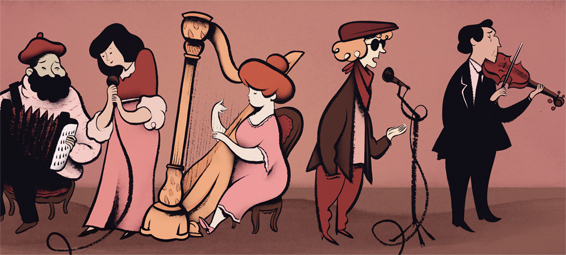Here are two things hard to come by in Dallas: an evening of serious (what used to be wrongly called “classical”) music that stunningly combines the old and the new, the conservative and the avantgarde; and a pair of arts patrons who keep themselves well away from the social circuit and the society pages.
Now in its second season, Soundings: New Music at the Nasher has produced this city’s most exciting and intelligent musical programming in the 40 years I have lived here. It’s the collaborative artistic brainchild of several people. The musical godfather is Seth Knopp, a member of the Peabody Trio and director of the Vermont-based Yellow Barn Music School and Festival. Its other parents are Jessie and Charles Price, local philanthropists. You probably have never heard of them. All of them give additional credit to Jeremy Strick, the Nasher’s director, who has his own commitment to innovative programming.
The inaugural season featured events that mixed Beethoven and Bartók with a Texas Panhandle auctioneer, that united counterpoint and marimbas, dissonant moderns and Bach’s Art of the Fugue. September 2011’s evening alternated slam poetry with Gustav Mahler. Soundings is all about connections, continuities as well as differences, between and among things. In November we had Gypsy, Jewish, and Bosnian music, for violin, clarinet, accordion, and human voice. Some will like everything in these evenings. Everyone will like something. It’s not a hodgepodge but an amazing bag of unpredictable matings.
Two more events are forthcoming. On March 9, there’s a trio of musicians—fl ute, viola, harp—playing works by the known and the contemporary unknown: “Tradition and Invention Traced by the Voices of Three Centuries.” On April 20, we get violinist Anthony Marwood and pianist Alexander Madzar in “A Dialogue of Caprice and Masterpiece.” The duo will mix Schubert, Bartók, and Debussy (the standards), with Berio, Sciarrino, and Widmann. Don’t worry if you haven’t heard of the last three. You won’t be scared off.
All of this is exciting stuff, and it’s the result of Knopp’s friendship with the Prices. Charles, the more public of the private couple, is the eldest of six children. The family lived in Bartlesville, Oklahoma. In 1952, Charles’ grandfather, Harold Price, commissioned Frank Lloyd Wright to build a skyscraper, which still commands the plains. Wright also did a house for Charles’ father. For architecture buffs, Bartlesville has been on the map for more than a half century.
Charles Price is not a cornpone boy from the Dust Bowl. Not too many people anywhere can say they grew up in a Frank Lloyd Wright house. And his upbringing affected Price’s adult life. As a young man, he developed a penchant for the unpredictable and the new. Charles and Jessie met in law school at Boulder in 1977. They moved to Dallas 30 years ago. They have kept under the radar since then.
When it came time to build a house for themselves here in the late ’80s, the Prices worked with an avant-garde American architect who made for them a home suitable for an art collection, on a hidden property in North Dallas that contains a stream and a trio of small ponds that produce a delicious, continuously flowing sound. The gentle murmur offered inspiration to architect and clients. The Price house must be the only one ever built with a musical analogy in mind: Béla Bartók’s 1936 “Music for Strings, Percussion, and Celesta.”
I asked Charles how he came by his interest in music. He said he has always played the flute for pleasure, and also, less intensely, the piano. When he was a kid, he listened to old RCA Victor Red Seal records in his parents’ house. His father, an engineer, liked the up-to-date hi-fi equipment; Charles discovered that he liked the music as well. “You grow up listening to stuff and then you want to play it,” he says, sweetly assuming that every sensible person who plays records also plays instruments.
Soundings, he says, goes back to a conversation with Strick, and even earlier to similar conversations with Strick’s predecessor, Steve Nash. Because he knew Seth Knopp from The Yellow Barn organization, and because he also realized that he would have to bring someone with musical experience onto the scene, Price got the musician involved. The whole thing developed as a serendipitous meeting among people with an interest in something international and innovative.
Anyone who has attended the Soundings concerts will have noticed—as I have—the relative absence of furs and jewels in the audience. People want to listen to the music, not be seen. Even better, you don’t see people rushing to the doors as soon as the last note has sounded, as you do at the Meyerson or the Winspear. Can this continue? The Prices are committed to backing the series at least through next season. Afterward, “as long as the constellation holds” (meaning Knopp and Strick and public support), Charles Price says the prospects are good for their continued support. All three men give credit to one another. Best of all, the Prices, unlike many philanthropists, wish to remain quiet, although anonymity is not now possible.
Knopp praises the Prices for “never telling me to do things.” He has, he says, carte blanche. In the old days, patrons would listen to artists they liked, hear their plans and visions, and then support them. Now they tend not to. The Golden Rule prevails: He Who Has the Gold Makes the Rules. This is true not only in Dallas but virtually everywhere, especially where new money is trying to squeeze into society.
The Prices represent an older paradigm for artistic sponsorship. They offer help and then step out of the way to allow the artists to work their magic. Price gives all credit to Knopp, about whom he says: “Seth’s mind and ear for programming have been the keys to the program’s success, along with the support of the musicians who seem available at Seth’s call, like the Juilliard Quartet. There is a kind of genius in what he does.”





